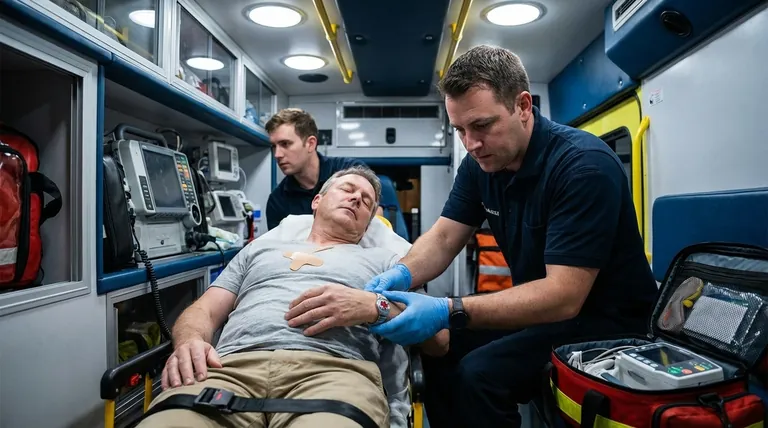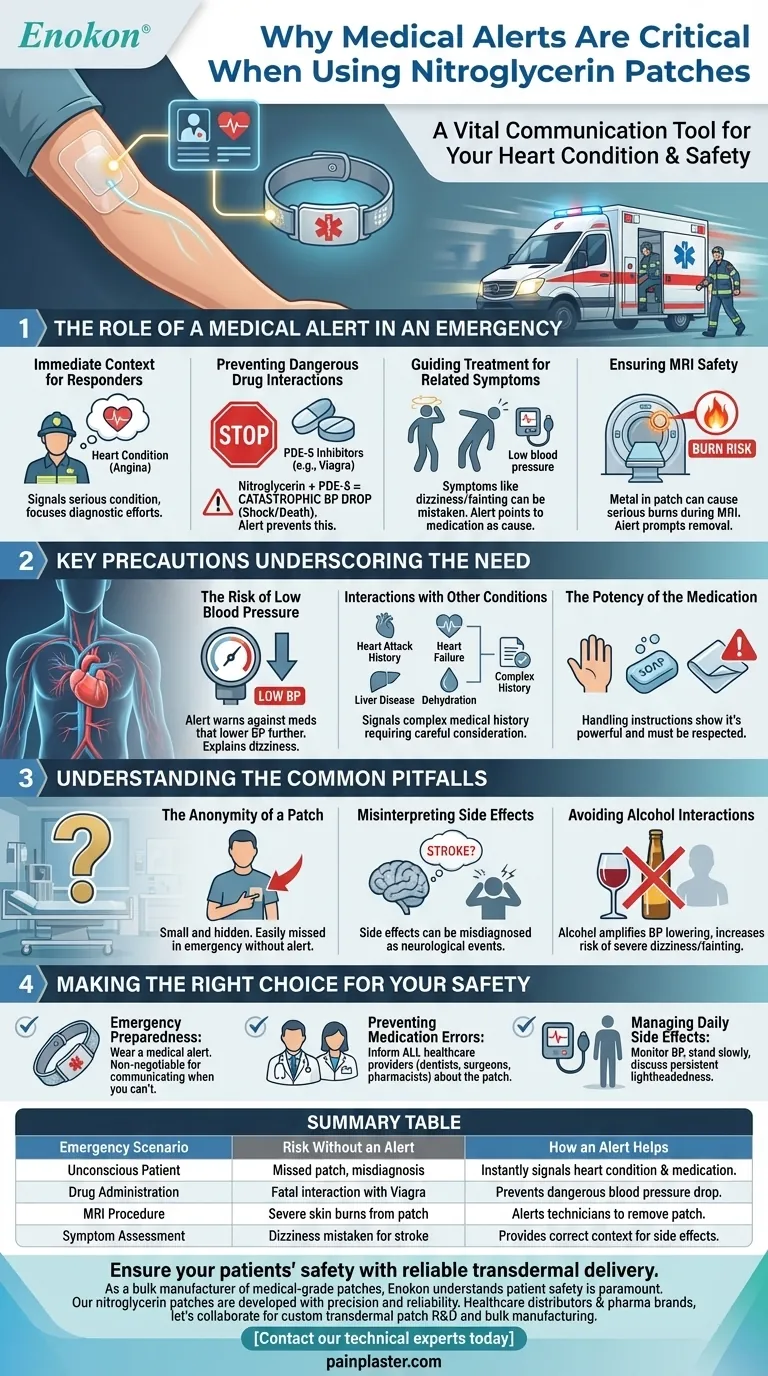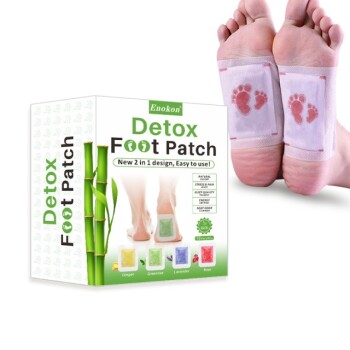In short, a medical alert is critical because a nitroglycerin patch signifies a serious underlying heart condition. In an emergency where you cannot speak for yourself, this alert immediately informs responders about your medication and health status, preventing potentially fatal treatment errors and guiding them toward safe, effective care.
A medical alert for nitroglycerin isn't just about the patch itself; it's a vital communication tool that reveals your underlying heart condition to medical professionals, ensuring that any emergency treatment you receive is compatible with your health needs.

The Role of a Medical Alert in an Emergency
When first responders arrive, they have to make critical decisions with limited information. A medical alert provides immediate, life-saving context that can drastically alter their course of action.
Immediate Context for Responders
A medical alert instantly signals that you are being treated for a serious heart condition, such as angina pectoris. This tells responders that chest pain, dizziness, or unconsciousness could be related to your heart, focusing their diagnostic efforts.
Preventing Dangerous Drug Interactions
This is one of the most critical functions of the alert. Nitroglycerin cannot be combined with PDE-5 inhibitors like sildenafil (Viagra). Administering these drugs together can cause a catastrophic drop in blood pressure, leading to shock or death. An alert prevents this mistake.
Guiding Treatment for Related Symptoms
Side effects of nitroglycerin include dizziness, fainting, and low blood pressure. If you are found confused or unresponsive, these symptoms could be mistaken for other conditions. The alert points responders toward the medication as a potential cause or complicating factor.
Ensuring MRI Safety
Some nitroglycerin patches contain aluminum or other metal components. These can heat up during an MRI scan and cause serious skin burns. A medical alert prompts technicians to look for and remove the patch before the procedure.
Key Precautions That Underscore the Need for an Alert
The strict safety protocols surrounding nitroglycerin highlight why clear communication via a medical alert is so essential. These precautions are in place because the medication is potent and interacts significantly with your body's systems.
The Risk of Low Blood Pressure
Nitroglycerin works by widening blood vessels, which lowers blood pressure. An alert warns medical staff against giving you other medications that could lower it further. It also explains why you might experience dizziness, especially when standing up quickly.
Interactions with Other Conditions
Safe use of nitroglycerin depends on your overall health. It is prescribed with caution for patients with a history of recent heart attack, heart failure, liver disease, or dehydration. The alert signals to responders that you have a complex medical history requiring careful consideration.
The Potency of the Medication
Specific handling instructions—such as washing hands after application and folding used patches before disposal—demonstrate the drug's potency. It's a powerful medication that must be respected, a fact an alert instantly conveys.
Understanding the Common Pitfalls
Without clear communication, several risks can arise. A medical alert serves as a safeguard against these common but dangerous scenarios.
The Anonymity of a Patch
A patch is small and often hidden under clothing. If you are in an accident or become unconscious, it is very easy for medical personnel to miss it. A visible medical alert is the only reliable way to signal that this unseen medication is on your body.
Misinterpreting Side Effects
In an emergency, the medication's side effects—dizziness, fainting, headache—can easily be misdiagnosed as symptoms of a new neurological event like a stroke. The alert provides the correct context, ensuring you aren't misdiagnosed or given inappropriate treatment.
Avoiding Alcohol Interactions
Alcohol can amplify the blood-pressure-lowering effects of nitroglycerin, increasing the risk of severe dizziness and fainting. If a patient is found unresponsive and alcohol is a factor, the alert helps medical teams understand the full clinical picture.
Making the Right Choice for Your Safety
Using this information allows you to take proactive steps to ensure your well-being while using a nitroglycerin patch.
- If your primary focus is emergency preparedness: A medical alert bracelet or necklace is non-negotiable. It is the most effective way to communicate your condition when you can't.
- If your primary focus is preventing medication errors: Always inform every single healthcare provider, including dentists, pharmacists, and surgeons, that you use a nitroglycerin patch.
- If your primary focus is managing daily side effects: Monitor your blood pressure, stand up slowly to prevent dizziness, and discuss any persistent lightheadedness with your doctor immediately.
Ultimately, a medical alert is a simple tool that provides a profound layer of safety, ensuring your treatment is always informed by your needs.
Summary Table:
| Emergency Scenario | Risk Without an Alert | How an Alert Helps |
|---|---|---|
| Unconscious Patient | Missed patch, misdiagnosis | Instantly signals heart condition & medication |
| Drug Administration | Fatal interaction with Viagra | Prevents dangerous blood pressure drop |
| MRI Procedure | Severe skin burns from patch | Alerts technicians to remove patch |
| Symptom Assessment | Dizziness mistaken for stroke | Provides correct context for side effects |
Ensure your patients' safety with reliable transdermal delivery.
As a bulk manufacturer of medical-grade patches, Enokon understands that patient safety is paramount. Our nitroglycerin patches are developed with precision and reliability in mind. If you are a healthcare distributor or pharma brand looking for a trusted partner for custom transdermal patch R&D and bulk manufacturing, let's collaborate.
Contact our technical experts today to discuss how we can support your product development with our expertise in creating safe and effective transdermal solutions.
Visual Guide

Related Products
- Far Infrared Deep Heat Relief Patches Medicated Pain Relief Patches
- Capsaicin Chili Medicated Pain Relief Patches
- Heating Pain Relief Patches for Menstrual Cramps
- Asthma Cough and Pain Relief Patch for Adults and Kids
- Menthol Gel Pain Relief Patch
People Also Ask
- How should pain relief patches be applied and used? A Guide to Safe & Effective Targeted Relief
- How often should pain relief patches be used? Get the Right Schedule for Targeted Relief
- How effective are pain relief patches for muscle pain? Target Localized Pain with Transdermal Delivery
- What are pain relief patches and how are they used? A Guide to Safe, Targeted Relief
- How do pain relief patches work? A Guide to Targeted, Long-Lasting Pain Relief














